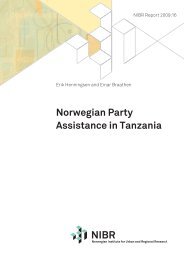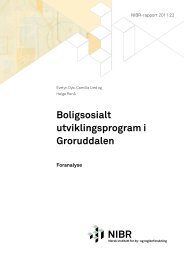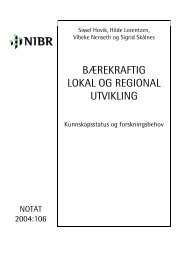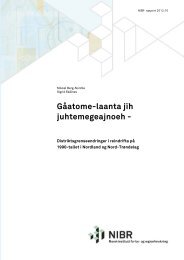http://www.tandfonline.com/page/terms-andconditions
The special importance of housing policy for ethnic minorities ...
The special importance of housing policy for ethnic minorities ...
- No tags were found...
Create successful ePaper yourself
Turn your PDF publications into a flip-book with our unique Google optimized e-Paper software.
International Journal of Housing Policy 3Downloaded by [Norsk Institutt for By og] at 07:07 11 March 2013particular difficulties in accessing decent housing, which could be increased or lessenedby different elements of housing policy. For example, rules for access or loans to housingcan improve or hamper immigrants’ possibilities of getting access to certain tenures. If thehousing market is difficult to understand, it is likely to be more difficult for immigrantswith a limited knowledge of the host society to act on the market and find good solutionsto their housing needs (Søholt, 2007; Søholt & Astrup, 2009a).As has been established in studies of tenure preferences (Skifter Andersen, 2011; Artle& Varaiya, 1978), demand for homeownership is highly dependent on future expectations. Ifhouseholds expect stable future conditions like employment, rising in<strong>com</strong>e and permanentsettlement, they will be much more inclined to opt for homeownership. Newly arrivedimmigrants, especially, are often uncertain about their future and whether they will settlepermanently in the new country or go back to where they came from. It must therefore beexpected that immigrants, all things being equal, will have a higher preference for rentingthan the native population.Some studies (Aalbers, 2002; Andersson, 1998; Skifter Andersen, 2008; Søholt &Astrup 2009a; Molina, 2010) point to discriminatory practices in the housing market thatdisadvantage ethnic minorities. In particular, social/public and private landlords to a certainextent exclude ethnic minorities from their housing. The extent to which discriminationoccurs can depend on the way housing tenures are regulated and supported through housingpolicy. If access to housing is very dependent on decisions made by administrators ofhousing and is subject to local discretion, there is greater scope for discrimination than ifthere are strict rules on the allocation of vacant dwellings. Moreover, the level of demandfor the housing in question is important: if demand greatly exceeds supply there will bequeues, which will tend to generate conditions more conducive to discrimination. Onemanifestation of discrimination in the private rental market is that immigrants may haveto pay more than the native population, if there is no rent regulation (Røed Larsen &Sommervoll, 2011). Surplus demand can either be a result of price and rent regulationsthat keep prices and rents below market levels, or could be due to a housing shortage ingeneral, or that the supply of publicly supported housing for low-in<strong>com</strong>e groups is toolow. There could also be discriminatory practices among banks or institutions providingcapital for the purchase of housing if, as a result of prejudice, ethnic minorities are seen asless solvent customers. Discrimination against immigrants by financial institutions can beinfluenced by the extent of public subsidies for housing and can be reduced by public loanguarantees.In many countries in northern Europe, immigration has grown in recent years and therehas been a general tendency among immigrant families to settle in certain parts of thehousing market, in limited parts of the cities (Musterd, Ostendorf, & Breebaart, 1998). Inmany countries they have settled in social/public housing. In this way some neighbourhoodsin the cities have gained a large proportion of ethnic minorities and have been transformedinto what we call ‘multi-ethnic neighbourhoods’, in which the majority ethnic population hasbe<strong>com</strong>e a minority. It has been shown (Musterd, 2005; Johnston et al., 2002; Finney, 2002;Fong & Chan, 2010) that there is great variation between different ethnic groups concerningthe extent that they live in neighbourhoods with a high concentration of immigrants.Preferences for living in neighbourhoods with fellow countrymen could be importantin influencing which tenures and dwellings immigrants try to obtain and the kind ofac<strong>com</strong>modation they can access. In different countries, ethnic enclaves and multi-ethnicneighbourhoods have been established in tenures, depending on how easy it has beenfor immigrants to gain access to these tenures. In some countries it has taken place inprivate rented housing, in others in social/public housing and sometimes in owner-occupied
















